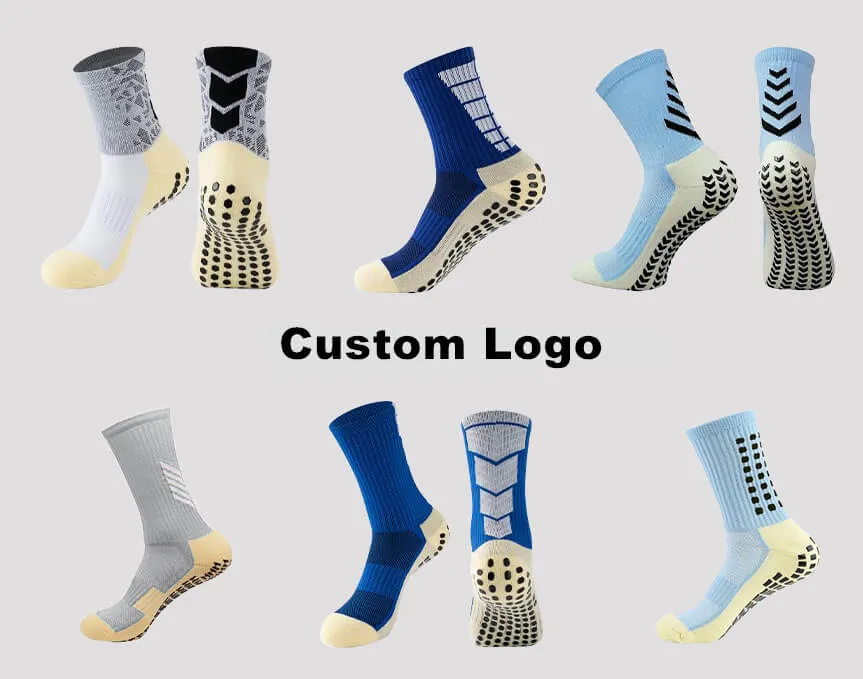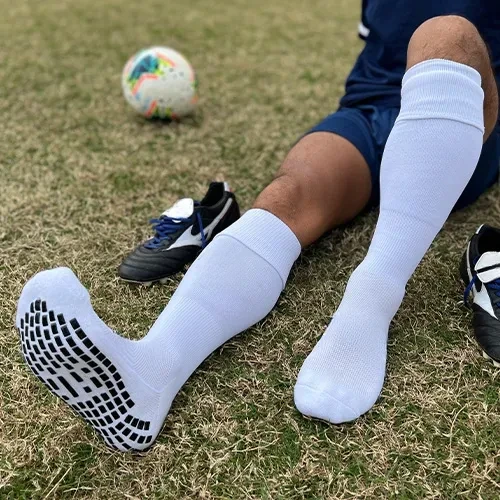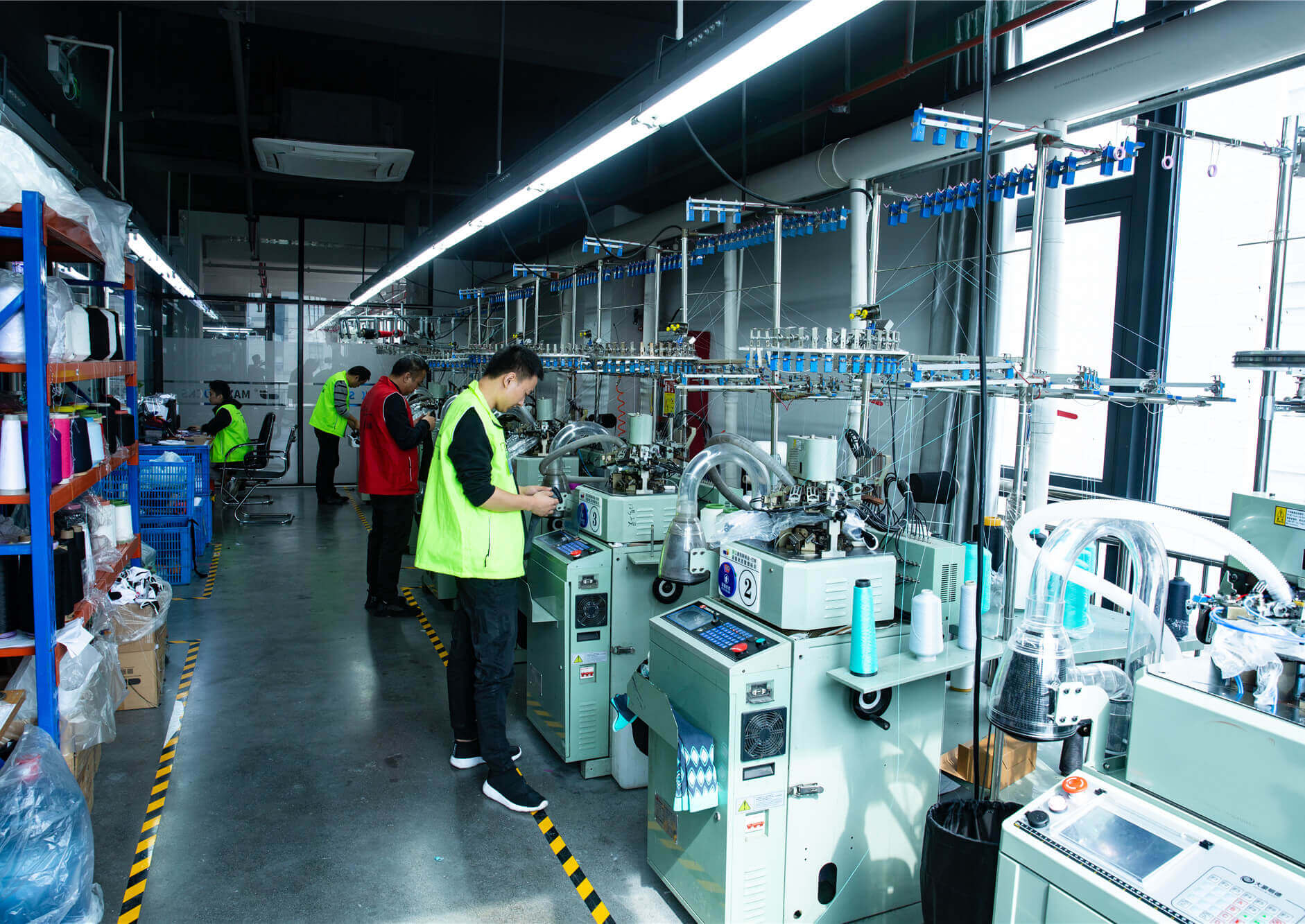Introduction: The Critical Role of Supplier Selection
Selecting the right football grip socks supplier represents a decision with far-reaching implications that extend well beyond simple price considerations. In today's competitive sporting goods market, the quality of grip socks directly impacts athlete performance, team presentation, and customer satisfaction for retail businesses. This comprehensive guide explores the essential factors to consider when evaluating potential football grip socks suppliers, from manufacturing capabilities and material quality to customization options and business reliability. Whether you're a team manager seeking consistent performance equipment, a sporting goods retailer expanding your product line, or a distributor building supplier relationships, understanding these critical selection criteria will help you establish partnerships that deliver consistent quality, reasonable pricing, and reliable service. By approaching supplier selection as a strategic decision rather than a simple procurement exercise, you can avoid the common pitfalls that lead to inconsistent product quality, delivery delays, and communication challenges that undermine both performance and profitability in the specialized grip socks market.

Understanding Grip Sock Manufacturing
How Technology Shapes Performance
Football grip sock performance depends on more than just visible grip dots. Quality suppliers use precise silicon printing techniques to apply evenly distributed patterns across the sole. These aren’t random designs—they’re engineered for multidirectional traction. Leading factories develop their own silicone formulas to ensure durability and grip consistency across turf, grass, or indoor surfaces. Proper bonding between the base fabric and grip material is also essential. Heat-setting techniques help prevent separation, unlike low-cost adhesive methods that wear off quickly. These technical factors reveal whether a supplier truly manufactures or simply resells generic versions without real control over product quality.
Materials Matter
The materials used define comfort, fit, and lifespan. Reliable suppliers select athletic-grade cotton blends with optimized moisture control and breathability, not just cost savings. Higher elastane percentages (5–8%) ensure long-term shape retention—low elastane content causes sagging and loose fit over time. For the grip areas, premium manufacturers use medical-grade silicone that resists cracking and hardening. This ensures steady grip across washes and games. Trusted partners offer material specs and testing data, covering shrinkage, colorfastness, and durability under stress. These benchmarks separate true performance-focused producers from suppliers chasing margins at the cost of long-term quality.
Evaluating Supplier Capabilities
Production Capacity and Scalability
A football grip sock supplier’s production capacity directly impacts their ability to fulfill orders consistently, especially when demand grows or fluctuates seasonally. Reliable manufacturers maintain sufficient manufacturing capacity and flexibility to handle both regular orders and peak-season surges without compromising delivery timelines or product quality. Scalability means the supplier can maintain consistent grip sock quality even when running at full or near-full capacity. The ideal factory operates at 70-80% capacity, providing room to increase shifts or production lines during busy periods. Automated quality control systems embedded throughout the manufacturing process help maintain consistent product standards and reduce defects compared to manual inspection alone. For sports teams, retailers, or distributors expanding their inventory, partnering with suppliers who can scale production efficiently ensures stable supply and supports long-term growth.
Quality Control and Product Testing
Effective quality control (QC) is vital to ensure football grip socks meet performance, durability, and safety standards consistently. Top suppliers implement multi-stage QC protocols covering incoming material inspections, in-line process checks, and final product testing using objective methods. Common tests include wash durability tests to verify grip retention after multiple washes, stretch and recovery assessments to ensure socks maintain shape and fit, and friction tests to confirm consistent grip performance across batches. Reputable manufacturers share QC data transparently and often hold internationally recognized certifications like ISO 9001, which validates their quality management systems through independent audits. These robust QC processes guarantee consistent sock quality, helping teams maintain athlete performance and retailers build customer loyalty by offering reliable, high-quality products.
Evaluating Supplier Capabilities for Football Grip Socks
Production Capacity and Scalability
Assessing a football grip sock supplier’s production capacity is essential to ensure they can meet your order volumes consistently. Reliable manufacturers maintain sufficient manufacturing output and scalability to handle seasonal demand fluctuations or sudden order increases without extending lead times. Ideal suppliers operate around 70-80% capacity, providing flexibility to add shifts or ramp up production while maintaining stable quality. Scalability also means sustaining consistent product standards during high-volume runs, supported by automated quality control systems integrated throughout the manufacturing process. For retailers, distributors, or sports teams expanding product lines or inventory, choosing a supplier with proven scalable production ensures timely delivery and reduces supply chain risks.
Quality Control Processes and Certifications
Quality control (QC) is a vital indicator of a supplier’s reliability and product consistency. Top football grip sock manufacturers implement rigorous multi-stage QC checks, including raw material inspection, in-process monitoring, and final product testing for grip durability, colorfastness, stretch recovery, and friction performance. Transparent suppliers provide documentation of these processes and often hold internationally recognized certifications such as ISO 9001 (quality management) and OEKO-TEX® (textile safety). Regular testing and QC ensure grip socks deliver reliable performance and durability across production batches, supporting brand reputation and customer satisfaction. Evaluating QC protocols and certifications helps brands and retailers minimize defects, returns, and inconsistent quality in the competitive football grip sock market.
Business Reliability Factors
Financial Stability and Business Longevity
A supplier’s financial stability is crucial for consistent production, quality improvements, and reliable order fulfillment. Established football grip sock manufacturers with over five years of industry experience typically possess the financial strength to handle market fluctuations, raw material cost changes, and invest in advanced manufacturing technology. Indicators of stability include facility expansions, technology upgrades, and steady workforce levels. Suppliers with a diverse client base across multiple markets tend to be more resilient than those dependent on a few major customers. This financial foundation supports long-term partnerships by ensuring consistent product quality and timely delivery, reducing supply chain risks compared to suppliers prioritizing short-term profits without reinvestment.

Communication and Responsiveness
Effective communication is a key indicator of a supplier’s professionalism and impacts collaboration success. Quality football grip sock suppliers assign dedicated account managers familiar with both product details and order logistics, providing clear, timely responses. Proactive updates about production status, delays, or material changes reflect transparency and reliability. Modern suppliers utilize digital platforms for order tracking and specification management, reducing errors and improving efficiency. Multilingual support or professional translation services are important for international buyers to avoid misunderstandings that could affect quality. Strong communication practices foster smoother relationships and quicker problem resolution, making them essential alongside price and product quality when evaluating suppliers.
Pricing and Cost Considerations
Understanding Price Components
A clear breakdown of pricing from football grip sock suppliers reveals much about their business practices and product quality. Transparent suppliers detail material costs, manufacturing expenses, customization fees, and overhead, helping buyers compare offers beyond mere unit prices. Quality manufacturers justify higher prices through premium yarns, advanced knitting technology, rigorous quality control, or eco-friendly certifications—factors that ensure durability and performance. Customization charges should fairly reflect actual design complexity, avoiding opportunistic markups. Understanding these price components enables brands and retailers to assess value accurately, build reliable budgets, and anticipate potential cost changes in long-term supplier relationships.
Volume Discounts and Partnership Pricing
Volume discounts indicate a supplier’s commitment to growing with your business. Reputable manufacturers offer tiered pricing that rewards larger orders with reduced unit costs, aligning your growth with cost efficiency. Beyond quantity discounts, strategic partnership pricing may include flexible payment terms, exclusive product options, or inventory support programs that improve supply chain reliability. Suppliers who formalize these arrangements via clear contracts demonstrate professionalism and foster trust. For teams, retailers, or distributors, such pricing models reduce risks of supply disruptions and support scalable, cost-effective procurement, ensuring football grip socks consistently meet performance and budget goals.
Ethical and Sustainability Considerations
Labor Practices and Working Conditions
Ethical labor practices are a crucial factor when selecting football grip sock suppliers. Responsible manufacturers ensure fair labor standards such as safe working environments, reasonable hours, and fair wages, avoiding exploitative conditions that could cause reputational risks or supply disruptions. Verification via third-party certifications like WRAP or SA8000 offers reliable proof of ethical compliance beyond supplier claims. Transparency in manufacturing locations and openness to audits or visits further indicate trustworthy operations. Leading suppliers also invest in worker welfare programs covering skills training and health initiatives, reflecting a commitment beyond minimum legal requirements. For brands and retailers emphasizing corporate social responsibility or ethical sourcing, assessing labor practices helps align supplier partnerships with organizational values. Consumer awareness of supply chain ethics continues to rise, making supplier labor standards as important as quality and cost in today’s football grip sock market.
Environmental Responsibility
Sustainability is becoming a key priority in football grip sock sourcing. Progressive suppliers adopt environmental measures such as water recycling, energy efficiency, and waste reduction, reducing their ecological footprint and operational costs. Material choices emphasize recycled fibers and reduced chemical use while maintaining athletic performance. Sustainable packaging with recyclable or biodegradable materials also signals supplier commitment. Certifications like ISO 14001 and bluesign® validate systematic environmental management rather than isolated efforts. For teams, retailers, and brands with sustainability goals, partnering with environmentally responsible suppliers supports green initiatives and appeals to eco-conscious consumers and athletes. Environmental practices now weigh heavily alongside product quality and price, especially in niche markets like football grip socks where brand reputation and consumer values influence buying decisions.
Shipping Options and Delivery Reliability
The logistics capabilities of football grip sock suppliers play a crucial role in inventory management, fulfillment reliability, and overall satisfaction for teams and retailers. Here are key aspects to consider:
Diverse Shipping Methods and Carriers
Top suppliers work with multiple shipping partners to provide a range of delivery options. This variety helps balance speed, cost, and reliability, allowing you to choose what best fits your budget and timeline. Knowing the available shipping methods upfront helps avoid unexpected delays or high fees.
Transit Times and Cost Transparency
Clear information on typical transit times and shipping costs helps set realistic delivery expectations. This allows for better inventory planning and avoids surprises after orders are placed. Transparent pricing also prevents hidden fees that could affect your overall sourcing budget.
Real-Time Tracking and Shipment Visibility
Advanced suppliers offer digital tracking systems that provide real-time updates on your shipments. This transparency reduces uncertainty, allowing you to monitor deliveries closely and plan accordingly, which is especially important for time-sensitive orders.
Flexible Fulfillment and Risk Management
Flexibility in order fulfillment—such as consolidation of shipments, split deliveries, or partial shipments—demonstrates a supplier’s ability to adapt to your business needs. Additionally, clear insurance policies and defined responsibilities for in-transit damages reflect professionalism and protect your investment during shipping.
Order Management Systems
Order management systems (OMS) used by football grip sock suppliers significantly affect operational efficiency and error reduction. Top manufacturers deploy digital OMS platforms that simplify order communication, placement, approval, and production tracking, avoiding errors common in manual processes. These platforms provide access to order histories, specification archives, and communication logs, offering accountability and easy reference when resolving queries. Simplified reorder functions enable efficient repeat purchases without re-entering full specifications. Integration with client systems via APIs or standardized data formats enhances efficiency, especially for large orders. Robust security protects proprietary designs and payment information, reflecting professional standards and risk management. Evaluating OMS capabilities helps identify suppliers whose infrastructure supports smooth collaboration and reduces administrative burdens—an important factor beyond product quality and price when selecting football grip sock partners.
Supplier Reputation and Verification
Client References and Case Studies
Existing client feedback provides valuable insight into a football grip sock supplier’s real-world performance beyond marketing claims. Reliable manufacturers offer references willing to share detailed experiences on product quality, order consistency, delivery reliability, and responsiveness to challenges. Case studies showcasing projects similar to your needs—comparable volumes, customization, and specs—help demonstrate relevant supplier experience. Long-term client relationships often indicate consistent quality and fair practices, highlighting suppliers focused on sustained partnerships rather than short-term gains. These verified references reduce risk by confirming that a supplier’s operational capabilities match their promises.
Industry Certifications and Standards
Industry certifications validate a supplier’s commitment to quality and compliance beyond internal claims. Key certifications include ISO 9001 for quality management, OEKO-TEX® for textile safety, and other sport-specific performance approvals. Membership in organizations such as the World Federation of the Sporting Goods Industry (WFSGI) signals adherence to recognized business and ethical standards. Awards or third-party recognitions further support credibility, especially those based on innovation or verified quality. These certifications and affiliations provide assurance that the supplier meets established standards important for reliability and product safety in football grip socks.
Reputation Among Professional Users
The supplier’s reputation within professional sports teams and athlete communities offers practical validation of product performance and reliability. Brands trusted by high-level users usually maintain strict quality standards to meet demanding conditions. Positive feedback and endorsements from professional athletes or teams show that the supplier delivers durable, functional football grip socks capable of performing under pressure. This real-world acceptance helps confirm the supplier’s credibility and reduces the risk of quality or service issues after engagement, complementing formal certifications and client references.
Conclusion: Building Strategic Supplier Partnerships
Choosing the right football grip socks supplier isn’t just ticking a box—it’s a game-changing move for your team or business. When you dig into their manufacturing skills, customization options, reliability, and ethics, you’re setting yourself up for socks that perform, prices that make sense, and service you can count on. Avoid those headaches of flaky quality or late deliveries. Want to skip the guesswork? Check out Max Hosiery’s website, where custom football grip socks are made just for you—because your team deserves nothing less.

Great partnerships don’t happen by chance—they grow when both sides work together, talk openly, and share the same goals. Whether you’re a coach looking for that perfect fit, a retailer ready to expand your lineup, or a distributor building a top-notch network, using this guide will help you find the right match. And hey, why not start your journey with Max Hosiery? Explore our site, customize your socks, and get ready to score big with reliable, high-quality gear tailored just for your needs.
FAQ Section
What key factors should I consider when choosing a reliable football grip sock supplier?
Look for proven experience, consistent product quality, in-house manufacturing, and strong customization support. Review samples, client feedback, and grip performance. Reliable suppliers offer clear communication, quality control, and timely delivery.
How long does custom grip sock production typically take from design approval to delivery?
Production usually takes 2–6 weeks, depending on design complexity and order size. Timelines include sample approval, bulk production, QC, and shipping. Reliable suppliers provide clear schedules and updates.
What quality certifications should I look for when evaluating football grip sock suppliers?
Look for ISO 9001, OEKO-TEX® Standard 100, and WRAP or SA8000. bluesign® is valuable for eco-conscious buyers. Performance testing reports on grip strength and wash durability are also important.
How can I verify a supplier's manufacturing capabilities rather than working with trading companies?
Request videos or photos of production lines, ask to speak with technical staff, check business licenses, and confirm in-house capabilities. Site visits or audits also help confirm factory status.
What payment terms are standard when working with football grip sock suppliers?
A 30% deposit with 70% before shipping is standard for new clients. Trusted partners may offer net-30 terms. Secure bank transfers or escrow services are recommended to avoid fraud.
